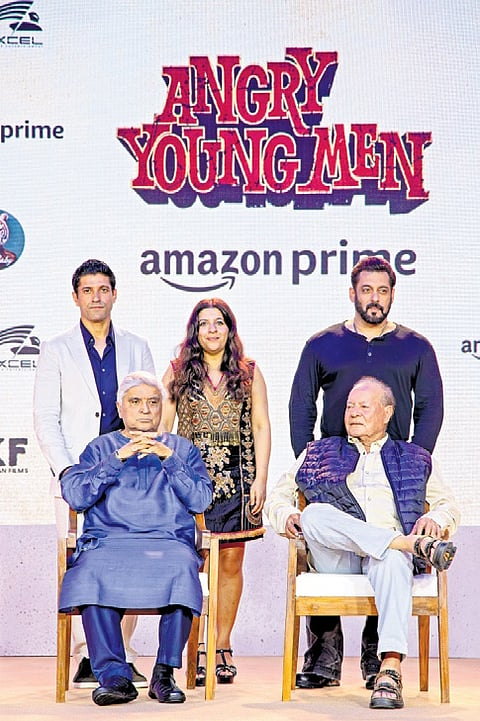

At first glance, it might seem strange to see Namrata Rao’s name credited as ‘Director’ after every episode of Angry Young Men, the Prime Video documentary on Hindi cinema’s most acclaimed writer-duo, Salim Khan and Javed Akhtar. The three-episode series serves as the directorial debut for Namrata, known for being the editor of films like Oye Lucky! Lucky Oye! (2008), Love Sex Aur Dhokha (2010) and Kahaani (2012) (She received two Filmfare awards and a National Award for the last two).
The seed for the documentary germinated on the sets of the anthology series Lust Stories (2018), in which filmmaker and Javed Akhtar’s daughter Zoya Akhtar was helming a segment and Namrata was serving as the editor. “It was Zoya’s idea. She always wanted to call it ‘Angry Young Men’,” says Namrata. “I had been looking for something to direct. This seemed interesting to start that journey with.”
Namrata’s entry into the filmography of Salim-Javed was with Seeta Aur Geeta (1972), which she watched reruns of on television. “I love the scene where Geeta’s character swings from a ceiling fan,” she says. She also has a vivid memory of watching Sholay (1975) when it aired for the first time on Doordarshan on Republic Day, 1995. “When I watched it, I didn’t know they had written it. I was 13 and didn’t even know that films were actually written,” she laughs. “But certain images from that movie were etched in my memory.”
The documentary features an impressive list of talking heads from Hrithik Roshan, Yash, Rajkumar Hirani, and Aamir Khan. Backed by Farhan Akhtar, Zoya Akhtar, and Salman Khan, access was never the issue. “But they are still celebrities,” says Namrata. “It is tough to get their time.” The shooting began in June 2021 and ended in May 2024. A footage of 700 plus hours was ultimately compiled into just three episodes. “I wanted it like that, each episode like one part of a three-act screenplay structure,” she says.
Two rebellious young writers in 1970s Bollywood, breaking age-old norms and practices of both the Hindi film screenplay and the industry, the story of Khan and Akhtar bubbles with the possibilities of a feature film. “Many have pitched the idea to them,” shares Namrata. “But it all ends when they say ‘pehle screenplay padhwao’ (firstly, give us the screenplay).” When asked if she or Zoya ever discussed making it into a feature film, she says, “No. Actually, the whole idea was to humanise them and also exhibit their personality and swag. To show how they are now. A documentary approach felt better.”
At one point in the series, Akhtar philosophises about the two kinds of people who should never work together: those who agree on everything and those who agree on nothing. He says that he and Khan had both similarities and differences which made them a formidable team. “They have had similar experiences,” says Namrata. “They both grew up in Madhya Pradesh, they both lost their mothers at a young age, they both had absent fathers.”
But, as writers, Khan and Akhtar had different strong suits. “Salim sir was the man with the ideas, the plotting, the narrative. It was his decision to cut off Thakur’s arms in Sholay. Javed saab, on the other hand, had the gift of the gab. It was his purview as to how a character will speak. Together, they were a great mixture of structure and texture,” she says.
The Salim-Javed blend gave birth to the ‘Angry Young Man’, a character immortalised by Amitabh Bachchan, ripples of whom can still be seen in recent blockbusters. “In the 70s, the focus was more on societal injustice. The struggle has become more personal now,” says Namrata. “Like if you see Gully Boy (2019), Animal (2023) or KGF, the battle of the lead characters is more internal than external.”
We ask if she feels there is a deification of anti-heroes in the current cinema. “In a way, yes,” she says. “Like in Deewar, Amitabh Bachchan’s Vijay becomes a criminal but ultimately dies in the end, that doesn’t happen now. The modern anti-hero doesn’t get punished by death, there might be other ways, like his family abandons him or he doesn’t get what he wants, but he doesn’t die.”
By delivering 22 hits out of the 24 they worked together on, Salim-Javed elevated the position of the writer in the industry. There was a time when they were paid more than the lead actor of the film. The baton, however, hasn’t been taken much forward. Writers still don’t find their names well-represented on film posters. “Bollywood remains a star-driven system.
There is still ignorance as to how important the script is. Producers believe that if you get a bunch of A-list actors together, people will flock to the theatres. To some extent that still happens,” says Namrata. “There has been some shift with OTT coming up but it is not major. Makers need to realise that it all starts with the word.”